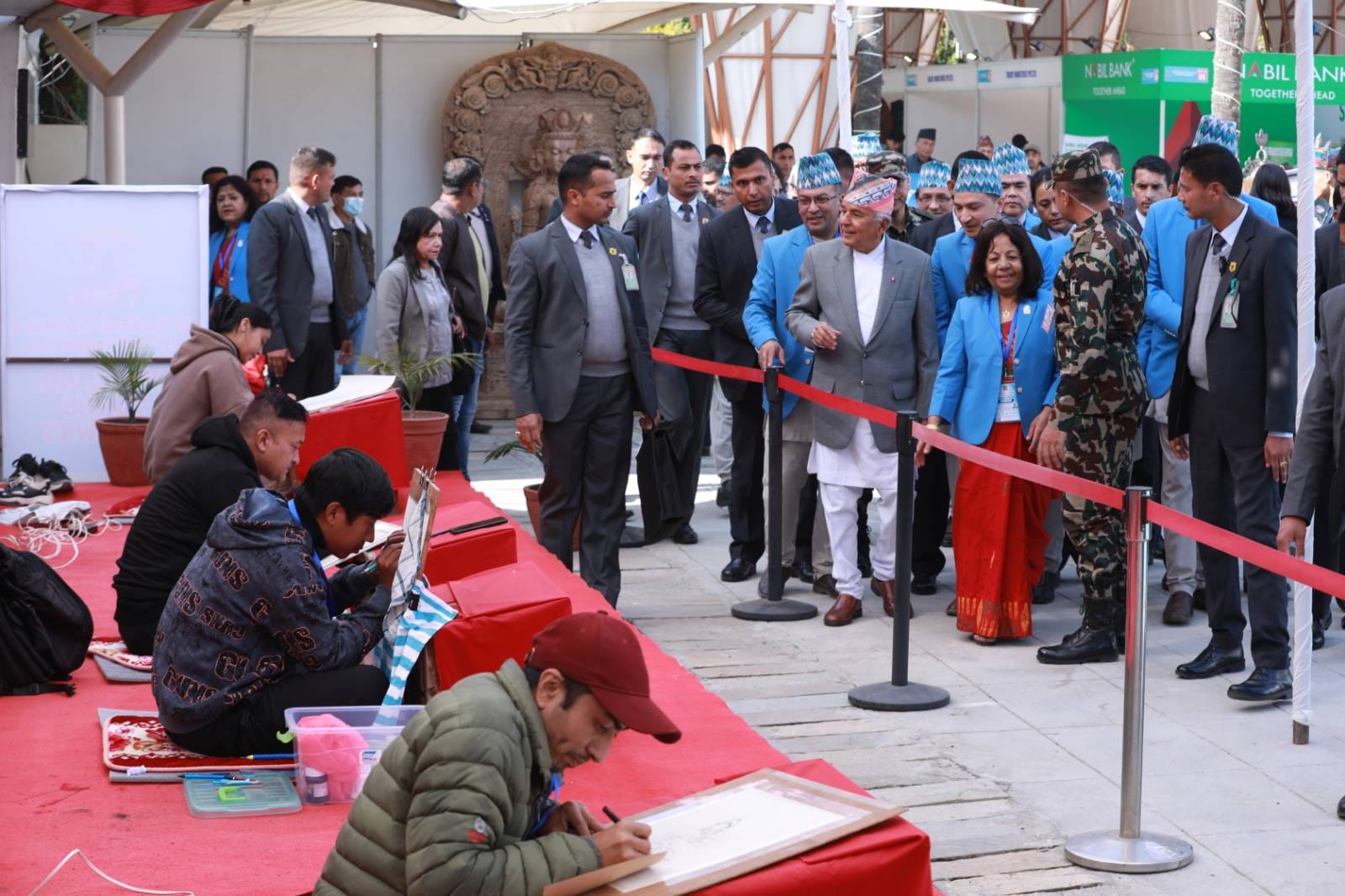

President Paudel stresses on handicraft trade and industry-friendly policy
Kathmandu, Dec 14: President Ramchandra Paudel has underscored the need of formulating business friendly Acts, laws and policies for the promotion of handicraft industry as it is the major sector for earning foreign currency.
Inaugurating the 20th Handicraft Trade Fair and 18th Handicraft Competition organised n the occasion of the 12th Handicraft Day here today, he said Nepal’s identity can be enhanced internationally through the promotion of handicraft industry and business.
The Head of State pointed out the need of creating an environment encouraging all the government entities for using the goods produced within the country with the goal of expanding the domestic market for goods manufactured by the handicraft industry.
“The handicraft industry is not only a business for Nepal, but it is also an important sector that introduces the country throughout the world by preserving the ancient civilization, unique culture and heritages. Along with this, Nepal’s identity and dignity can be promoted at the international-level through the uplift of the handicraft trade and industry,” the President said.
According to him, besides establishing the unique identity of the nation through the development and expansion of handicraft industry, a crucial contribution can be made to the overall national development, including the economic and social development.
The President opined that the Nepali handicraft goods cannot be easily copied as these are the indigenous products based on the ancestral skills and vocation of various castes and communities. He urged one and all to pay attention to securing the copyright of such types of products in time.
“It is necessary to make timely development of the traditional Nepali skills and products, securing the copyright and handing those skills and craftsmanship to the new generation,” he added.
Stating that the handicraft sector, which directly or indirectly employs around 1.1 million people, is an industry based on identity and an integral part of the economy, President Paudel said such types of productions contributed to spread Nepal’s identity throughout the world.
He further said, “The handicraft industry and business based on small capital, small-scale technology and local raw material, labour and skills is a sector with huge possibilities of expanding in villages, rural settlements and remote areas after agriculture. It is also an enterprise that can also be easily operated utilizing the local resources. The handicraft skills and technology has not been handed over to the youth generation despite it being such an important business.”
The President said it is necessary to establish the Handicraft Village through partnership of the federal, provincial and local governments and the private sector for conducting programmes and training required to hand over the traditional skills and technology.
“The local handicraft goods reflecting the indigenous art and culture have also contributed to the tourism business as well. These articles have not only attracted the domestic visitors but the foreign tourists as well,” he further added.
President Paudel stressed the need for paying a special attention to the production, the market demand, the product design, quality goods, value determination, good packaging, participation in the trade, fair and exhibition, publicity, promotion, research, development and copy right in exporting Nepali handicraft products in the context when the market is growing competitive.
Stating that the government was attentive to the development of the handicrafts sector which is connected with the country’s identity, Minister for Industry, Commerce and Supplies Ramesh Rijal said the government was ready in facilitating the exports of handicraft products.
“The handicrafts sector has played an important role in the development of economic and social sectors of the country and to create job opportunities. It has also made significant contributions to consolidate the national economy by promoting exports and replacing imports,” he said.
Similarly, calling for transferring traditional skills and techniques to the next generation, Sharad Bikram Rana, executive director of the Trade and Export Promotion Centre, emphasized that the handicrafts sector should attract the young generation.
He also called for the stakeholders to pay their attention to bring back the youth who are in foreign countries, and make the youth at home to be entrepreneurs. Likewise, mentioning that the concept of handicrafts as potential for prosperity has been forwarded, President of the Federation of Handicraft Associations of Nepal Prachanda Shakya maintained that the handicrafts sector played a supportive role in reducing the trade deficit of the country.
Over 1.1 million workers are engaged in the handicrafts sector, he informed. With the aim of promoting handicraft products, the Federation has been organising the handicraft trade fair since 2048 BS. More than 100,000 people are expected to visit the five-day fair, said the organisers. Handicrafts products are exhibited and sold in the fair.